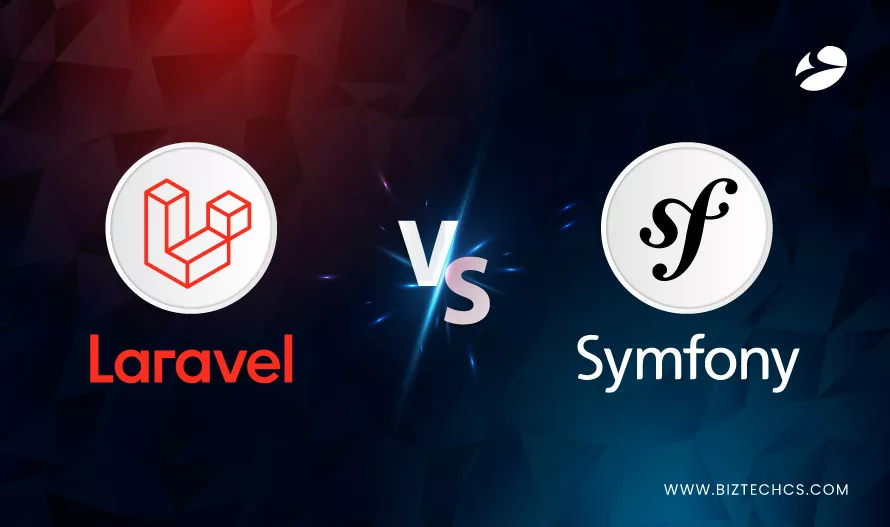3132
Laravel Vs Symfony: Which is The Better Framework in 2024?
7 min read
3132
7 min read
Table of content

All web frameworks seem one and the same unless you have to actually work with them. That’s when things start to get difficult and you end up feeling puzzled. Should I go with an open-source framework or the more easy-to-use one, should I prefer performance over scalability or vice versa; you may have pondered upon these facts if you have started the tedious job of choosing a web framework for your project.
Today, we intend to make your life less stressful with this Laravel vs Symfony guide that compares the two PHP web frameworks in depth. Scroll through the two frameworks, their benefits, drawbacks, similarities, and dissimilarities to choose your pick in 2024.
Then, you can decide whether to hire Laravel developers, Symfony developers or proceed with an in-house team.
Created by Taylor Otwell in June 2011, Laravel is an open-source PHP web framework. Based on Symfony and following the MVC architecture, Laravel is famous for its scalability, robust features, security, and huge community.
Its high customizability and vast ecosystem of libraries make it a perfect choice for full-stack development. However, it is preferred and used dominantly for server-side web development.
Use Cases of Laravel: BBC, Invoice Ninja, Ratio, Biozol, PaceX, Route1
Pros:
Cons:
Symfony is a PHP web application framework and a set of reusable PHP components/libraries. It was created by Fabien Potencier in 2005 and is now one of the most popular PHP frameworks used by developers around the world.
Based on MVC architecture and its extensive libraries, you can quickly build many essential features like routing, authentication, object configuration, and form creation.
Use Cases of Symfony: Spotify, Drupal, Trivago, Dailymotion, Natgeo, PHPMyadmin
Pros:
Cons:
While both Laravel and Symfony have their own set of disadvantages, you can overcome these challenges by availing of PHP development services. The experts should help you get rid of the issues and build a highly engaging, robust, and secure PHP application.
However, if you are still divided on what to choose between Symfony vs Laravel, here’s a detailed comparison for your reference. But before that, we will start with the similarities first.
| Aspect | Laravel | Symfony | Winner |
|---|---|---|---|
| ORM (Object Relational Mapping) | Eloquent ORM tool offers a layer of abstraction for database interactions, simplifying and streamlining database operations with a more object-oriented approach. | It uses Doctrine ORM, providing you with a more robust and flexible tool to handle complex queries. | Both |
| Template Engine | Laravel uses Blade template engine, which has a rather straightforward syntax. | Symfony uses Twig as its template engine, which comes with added capabilities like flexibility and extendibility. | Symfony |
| Routing | Laravel is known for its beginner-friendly and intuitive routing syntax. It allows for closure-based routes and supports middleware integration and route grouping. | Symfony’s routing system provides a high level of control and is designed to handle complex routing requirements. It allows for annotation-based routing and reuse of routing components. | Symfony |
| Performance | With very good performance, Laravel is an excellent choice for building small to medium-scale applications. With new upgrades, its performance is continuously elevating. The average website loading speed for a Laravel website is 60 milliseconds. | Performance of a Symfony-based framework is good. However, complex and large applications may load slowly compared to Laravel-based applications. Symfony-based sites take about 250 milliseconds to load, which is quite large compared to Laravel’s 60 ms. | Laravel |
| Learning Curve | Laravel is generally considered more beginner-friendly due to its simplicity and comprehensive documentation. | Symfony has a steeper learning curve with its granular level of control and complexity. | Laravel |
| Database Migration | Database migration in Laravel is performed manually without requiring any field definitions. | Database migration can be automated in Symfony frameworks. However, you will need to add small definitions for the fields of the model. | Both |
| Security | Laravel offers robust security features including user authentication and CSRF protection. It has a rather simple method for security maintenance. | Compared to Laravel, Symfony has a stronger security system with advanced capabilities like an authentication approach and a granular permission system. However, implementing these security practices can be tricky and you may need an expert’s help for it. | Symfony |
| Documentation | Laravel boasts extensive and very user-friendly documentation. | Symfony also has comprehensive documentation. However, it can be more technical and detailed leading to a steeper learning curve. | Laravel |
This PHP Laravel vs Symfony comparison should give you a clear idea of its capabilities, strengths, and weaknesses. Now, it is up to you to compare the two PHP frameworks head-on and decide which one is a better fit for your unique requirements.
Pro Tip: When comparing technologies, you have a plethora of options for your web project. Whether to choose a PHP-based technology, a JS-based technology, or simply PHP, it is a constant challenge. But to rise above these challenges, we present you with different guides that compare similar technologies; like our NodeJS vs PHP guide. Take a look to explore the various similarities and differences between the two technologies.
Both Laravel and Symfony are powerful PHP frameworks, each with its own strengths and ideal use cases. Laravel stands out for its ease of use, rapid development capabilities, and robust built-in features, making it a favorite among developers working on small to medium-scale projects or those requiring quick turnaround. Symfony, on the other hand, excels in flexibility, modularity, and scalability, catering to the needs of complex, enterprise-level applications that demand long-term maintainability and high performance.
This PHP Symfony vs Laravel guide should help you explore the various aspects of these two technologies so you can decide the one is more suitable for your project. However, one thing remains constant – and that is your need for expert developer talent to get the most out of these frameworks.
Connect with a web development company that can consult and give you expert technical assistance whether you choose Laravel or Symphony for your project. BiztechCS is one such PHP development company with over 17 years of experience in the field.
Want to consult industry experts for your project? Connect now!

Artificial Intelligence (AI)
58
By Nandeep Barochiya

Odoo
85
By Uttam Jain

Odoo
48
By Uttam Jain